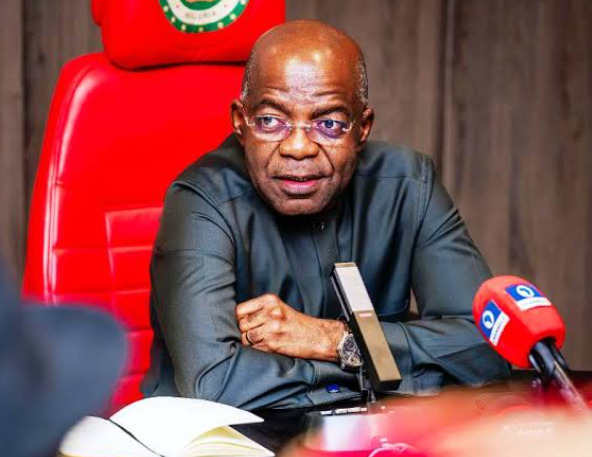
Southeast Tension Deepens as Governor Otti Shuts Tinubu’s ‘Renewed Hope Partners’ Office in Umuahia

In a dramatic twist that has intensified the already charged political atmosphere in the Southeast, Abia State Governor Alex Otti has reportedly ordered the immediate closure of the President Bola Ahmed Tinubu “Renewed Hope Partners” office in Umuahia, just days after the controversial Sokoto conviction of IPOB leader Nnamdi Kanu. The unexpected move has sparked a wave of reactions across the region, leaving many Nigerians asking the same question: what exactly is going on with Southeast leaders?
The incident comes at a time when the Southeast is already grappling with heightened political tension, emotional shockwaves, and simmering distrust between the federal government and sections of the region. Nnamdi Kanu’s latest conviction in Sokoto has reopened old wounds, reignited debates on justice, and stirred a sense of grievance among many who view the legal outcome as another chapter in the long and troubled relationship between the federal authorities and the Southeast. Against this backdrop, Governor Otti’s decision to shut down an office affiliated with the president’s political network has added yet another layer to the unfolding drama.
According to eyewitnesses and early reports, officials acting under directives from the Abia State Government stormed the Umuahia office early Tuesday morning, sealing the premises and ordering all activities to cease indefinitely. Staff present during the closure expressed shock, stating that the office had operated peacefully, conducting community outreach, empowerment programs, and political mobilization within the region. However, officials close to the Governor hinted that the action was taken due to concerns over “security implications” and “potential misuse” of the office during a period of heightened regional sensitivity. For many observers, these explanations seem incomplete, even evasive, prompting deeper speculation about the true motivations behind the move.
Critics argue that the shutdown is a politically charged response to Kanu’s conviction, designed to send a message to Abuja and demonstrate regional resistance at a symbolic level. Closing an office associated with President Tinubu’s administration at such a delicate time undoubtedly carries political weight. Some believe Otti is attempting to position himself as a protector of regional sentiment, mindful of the growing frustration among Southeast youths who feel marginalized, unheard, and disproportionately targeted in national political decisions. To these supporters, the Governor’s actions reflect courage and attentiveness to the emotional pulse of his people.
However, others fear that the move could further isolate the region politically, straining an already fragile relationship with the center. Political analysts warn that actions taken in the heat of tension could have unintended consequences, particularly when they involve shutting down political structures tied to the presidency. In Nigeria’s complex federal system, cooperation between state leadership and the presidency is crucial for developmental projects, infrastructural funding, and security collaboration. Critics of Otti caution that such a bold decision, if misinterpreted by Abuja, could complicate federal engagements that Abia State might rely on in the future.
Beyond political interpretations, many Southeast residents simply want clarity. The region has endured years of instability—sit-at-home orders, security operations, kidnappings, and economic stagnation—and any action that heightens tension is met with immediate concern. The closure of a political office on the heels of a highly emotional conviction has created speculation that the region’s leaders might be preparing for a deeper political standoff. Social media has erupted with mixed reactions—some applauding Otti for “standing his ground,” others accusing him of playing dangerous politics that could backfire.
Community members in Umuahia reported that the closure left a visible ripple effect. Traders near the building expressed worry that the action might attract protests or increased security presence in coming days. Some residents whispered fears about possible retaliation or clampdowns, recalling how quickly local incidents can escalate into regional unrest. Elders in the community urged calm and appealed for dialogue, emphasizing that Abia State has been relatively peaceful under the current administration and should not be drawn into avoidable political turbulence.
While Governor Otti has not yet released a detailed public statement explaining his decision, one of his senior aides hinted that the closure was “temporary” and based on intelligence assessments related to the current climate in the Southeast. According to the aide, the office could reopen once the government is satisfied that its operations do not threaten public order. This explanation has done little to calm the swirling public curiosity, as many still wonder whether the decision is connected directly—or indirectly—to the emotional fallout from Kanu’s conviction.
National political commentators are closely monitoring the situation, noting that actions taken by one Southeast governor often influence the mood across the region. The perception that the Southeast is undergoing a coordinated political shift, whether real or imagined, has become a growing conversation. With questions about leadership unity, federal relationships, and regional expectations, it is no surprise that many Nigerians are now asking, “What’s really going on with Southeast leaders?” The events in Abia might just be the beginning of a more pronounced political realignment, especially as calls for restructuring, justice, and regional autonomy continue to echo across the geopolitical zone.
Meanwhile, Abuja has maintained a cautious silence. Presidential aides contacted for comments either declined or stated they were still gathering details. The federal government’s eventual response—or non-response—could be pivotal. A firm stance could escalate tensions, while a diplomatic approach might calm nerves. Either way, the spotlight now falls squarely on the delicate balancing act required to manage both national unity and regional grievances in a moment where emotions run high.
Across the region, many are urging restraint. Civil society groups, religious leaders, and traditional institutions emphasize that political decisions, no matter how symbolic, should prioritize peace and stability. They warn that the Southeast cannot afford further unrest, especially at a time when businesses are struggling and young people are grappling with unemployment and insecurity. The message from these groups is clear: leaders must tread carefully to avoid inflaming tensions.
As the situation evolves, one thing remains certain: Governor Otti’s decision has opened a new chapter in the ongoing interplay between Southeast political identity and federal power. Whether it becomes a footnote in a turbulent week or the spark of something bigger will depend on how both state and federal authorities navigate the coming days. For now, Nigerians—and especially Southeast residents—wait anxiously for answers, hoping that the political storm brewing in Umuahia does not escalate into a larger regional crisis.
BREAKING NEWS: Days after Nnamdi Kanu Sokoto conviction, Governor Otti of Abia State ordered the closure of President Bola Ahmed Tinubu Renewed Hope Partners Office in Umuahia.
— SALAWU||OMOIYAONIPAKO (@salawueedris1) November 25, 2025
What's really going on with the Southeast leaders?🤦🏻♂️💔 pic.twitter.com/613zlU9aDa

